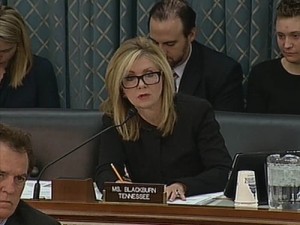 Rep. Marsha Blackburn (R-Tenn) plans to reintroduce the SOFTWARE Act, a bipartisan bill that would establish a new regulatory framework for health information technology, early next year. Blackburn announced the news at a Bipartisan Policy Center event yesterday.
Rep. Marsha Blackburn (R-Tenn) plans to reintroduce the SOFTWARE Act, a bipartisan bill that would establish a new regulatory framework for health information technology, early next year. Blackburn announced the news at a Bipartisan Policy Center event yesterday.
"In 1938, Congress passed the Federal Food Drug and Cosmetic Act, which gave authority to the FDA to oversee the safety and efficacy of drugs," she said. "So, section 201 of that legislation defined what a drug was. In the '70s it became necessary to go in to that piece of legislation and define medical devices as distinct from drugs. Now it’s almost 2015 and we have these new, different technologies that have come about and they provide improvements in the healthcare marketplace, ... but we don’t have a statuatory definition for this. So it is time to provide that definition. We’ve been very deliberate and very intentional and we have a piece of legislation that will do exactly what is needed and intended, so it protects patients, and provides the necessary regulatory clarity and certainty."
Just like the original iteration of the bill, this one splits health IT regulation into three categories, and leaves only the highest risk category in the hands of the FDA. The lowest risk category will remain unregulated, and the middle-risk category, which includes most health IT software, will be "subject to risk-based oversight," Blackburn said.
One criticism leveled against the original iteration of the SOFTWARE Act was that it proposed to remove the medium-risk category of health IT software from the FDA's jurisdiction, but didn't make it clear who would take on that regulatory burden. Blackburn said at the event that since the original introduction of the bill in late 2013, she has been working with stakeholders across the healthcare industry, including the BPC, to improve the bill, especially to answer the question of how that regulation will be addressed. The solution put forward by the BPC revolves around voluntary consensus-based standards adopted by the health IT industry.
"We think that having that clarity, having that certainty, is something that is so important and instead of pushing the bill forward, we’ve done draft after draft," she said. "Met, worked, talked, changed and now we’re ready to bring forward this final copy of this legislation. So we’ve got a few more tweaks we’re working on, but as we gavel back in on January 6th, one of the first pieces to be filed will be the SOFTWARE Act. It will be an integral part of the Bipartisan Effort on 21st Century Cures, and we look forward to moving it through the Senate and getting it on the President’s desk by early 2015."
Much of the rest of the event was spent in discussion of how those voluntary consensus-based standards could be implemented, and why industry stakeholders felt the new framework was needed. Stephanie Zaremba, Senior Manager for Government Affairs at athenahealth, articulated a widely-held industry view on the subject.
"Health IT vendors and their clients need clarity in the space," she said. "They need clarity that can only be provided through legislation. The agencies -- ONC, FDA, and FCC -- have done a great job, using every tool in their toolbox to say 'Here’s the path we’re going to take on patient safety and Health IT.' However, administrations change, and the regulations and guidance documents and reports that come out of these agencies can be revised fairly readily in the scope of a HealthIT development cycle. And this is not speculation. In my role as regulatory counsel, I meet with our developers pretty frequently. And they say 'Here’s the great new thing we’re going to do with Apple’s HealthKit. Do you have any concerns about future FDA regulation?' And I say to them, very honestly, I do not know. Today, we’re fine. But I cannot tell them that that won’t be different literally next year."
The Bipartisan Effort on 21st Century Cures, an initiative from the Energy and Commerce Committee, will include several pieces of legislation in addition to the Software Act. One, which Blackburn mentioned, will involve new privacy and security legislation.
"Congressman Peter Welch and I co-chaired a bipartisan privacy working group this last Congress," she said. "It was very successful, we have privacy legislation, data security legislation that we are working on. ... What Peter and I have done is spent the better part of two years getting agreement on where we go to address complaints in the virtual space."
Former Senator and Majority Leader Dr. Bill Frist (R-Tenn), the co-chair of the Bipartisan Policy Center, threw his support behind the legislation as well.
"With action by Congress and the administration and the private sector, we are at the cusp of creating a regulatory environment that rewards innovation, that provides accountability, that would create more certainty, that would support US capital investment, create jobs, and most importantly improve the health of individuals, of families and healthcare in this country," he said.














